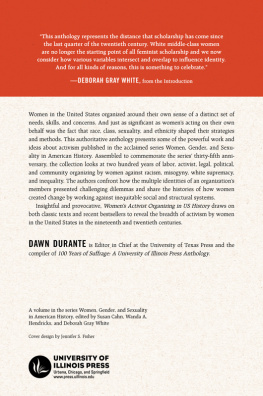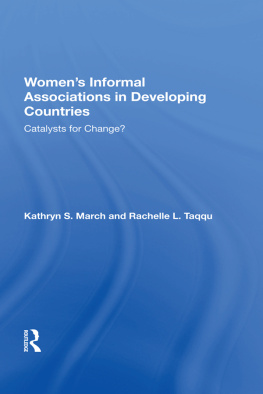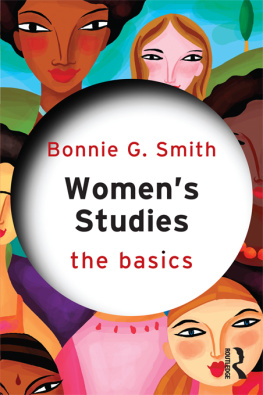2002 The University of North Carolina Press
All rights reserved
Manufactured in the United States of America
Designed by April Leidig-Higgins
Set in Electra by Copperline Book Services, Inc.
This volume was published with the generous assistance of the Greensboro Womens Fund of the University of North Carolina Press. Founding Contributors: Linda Arnold Carlisle, Sally Schindel Cone, Anne Faircloth, Bonnie McElveen Hunter, Linda Bullard Jennings, Janice J. Kerley (in honor of Margaret Supplee Smith), Nancy Rouzer May, and Betty Hughes Nichols.
The paper in this book meets the guidelines for permanence and durability of the Committee on Production Guidelines for Book Longevity of the Council on Library Resources.
Library of Congress Cataloging-in-Publication Data
Boylan, Anne M., 1947
The origins of womens activism: New York and Boston, 17971840 / Anne M. Boylan.
p. cm. Includes bibliographical references and index.
ISBN 0-8078-2730-4 (cloth: alk. paper)
ISBN 0-8078-5404-2 (pbk.: alk. paper)
1. WomenUnited StatesSocieties and clubsHistory. 2. Women social reformersUnited StatesHistory. 3. Women political activistsUnited StatesHistory. I. Title.
HO1904.B69 2002 305.406073dc21 2002001556
CLOTH 06 05 04 03 02 5 4 3 2 1
PAPER 06 05 04 03 02 5 4 3 2 1
Contents
Figures
1.1 Title page of the New York Female Associations 1824 Annual Report
1.2 Title page of the Boston Seamens Aid Societys 1843 Annual Report
1.3 Title page of the New-York Female Auxiliary Bible Societys 1821 Annual Report
2.1 Death certificate for Sarah R. Ingraham Bennett, 1882
2.2 Obituary for Catherine Mann Duplex [Dupleix], 1836
3.1 Memorial inscription that Joanna Graham Bethune composed for Divie Bethune and Isabella Marshall Graham
3.2 Original Elizabeth Bayley Seton gravestone, Emmitsburg, Maryland
3.3 Letter of administration for Henrietta Regulus Ray, 1836
3.4 Inscription on Mary Morgan Masons gravestone
4.1 Petition form in the June 15, 1843, Advocate of Moral Reform
4.2 Title page of the 1810 Report of the Committee of Claims on the Petition of Elizabeth Hamilton
5.1 Financial summary prepared in 1837 by Boston Seamens Aid Society treasurer Eunice Faxon Grigg
5.2 First page of a subscribers list, Roman Catholic Female Charitable Society, Boston, 1832
5.3 Pincushion, ca. 1835
5.4 Back cover of the Boston Seamens Aid Societys 1843 Annual Report advertising its clothing store
Acknowledgments
Because this Book Has been a long time on its journey from idea to reality, it is a special pleasure to be able to thank all the people and institutions who helped it on its way. I am especially indebted to the librarians and archivists who provided access to research materials, answered questions, and took the time to find sources for me. In the course of my research, I spent many happy hours at four great research institutions: the New York Public Library, the Boston Public Library, the New-York Historical Society, and the Schlesinger Library at Radcliffe College. The staffs at all four were most helpful and welcoming. I want particularly to single out the Milstein Division of Local History and Genealogy at the New York Public Library; without its rich resources, my search for obscure obituaries, marriage records, genealogies, and genealogical indexes would have been impossible. In addition, I thank the staffs of the following institutions: the New York Public Library Rare Books and Manuscripts Division; the New York Weill Cornell Medical Center Archives; the Columbia University Library Rare Books and Manuscripts Division; the Brooklyn Historical Society; the University of Delaware Library, Interlibrary Loan Department, and Archives; the Presbyterian Historical Society, Philadelphia; the Massachusetts State Library, Boston; the University of MassachusettsBoston Library Manuscripts Division; the Massachusetts Historical Society; the Congregational Library, Boston; and the Boston Public Library Rare Books and Manuscripts Room. I am also grateful to the staffs at the New York City Mission Society, Inwood House in New York City, and the Boston Widows Society, who made room in crowded quarters for a researcher interested in their organizational records.
Among the many efficient and interested librarians who assisted me, I want especially to thank Scott Taylor at the Georgetown University Library and Elizabeth Moger at the Haviland Records Room of the New York Friends Yearly Meeting. Other archivists, librarians, and historians answered queries or checked local records for me. They include Robert S. Cox of the William L. Clements Library, University of Michigan; the staff at the New York City Municipal Archives; Johanna Herring, archivist of Wabash College, Crawfordsville, Indiana; David Arthur, College of Arts and Sciences, Aurora University, Aurora, Illinois; the University Archives staff at Furman University; Mary J. Oates of the History Department at Regis College; Robert Johnson-Lally of the Archives of the Archdiocese of Boston; Rhona Neuwirth of Graham-Windham Services, New York City; John Van Horne, Philip Lapsansky, and the staff at the Library Company of Philadelphia; William Asadorian of the Queens Borough Public Library; Judith Metz, S.C., editor of the Elizabeth Bayley Seton Papers; Jewell Anderson Dalrymple of the Georgia Historical Society; Jay P. Dolan of Notre Dame University; Chris Kauffman, editor of U.S. Catholic Historian; J. Charles Swift; and Lori Beth Finkelstein.
Many colleagues and friends have actively supported my efforts over a long span of time. From the beginning, Ronald Walters and Anne Firor Scott had faith in the project, a faith that sustained me more often than they know. So, too, did conversations with Nancy Hewitt, Lori Ginzberg, Darlene Clark Hine, Leslie Friedman Goldstein, Susan Porter, Lynn Weiner, Susan Porter Benson, the late Winifred Wandersee, Joanne Meyerowitz, Jeanne Boydston, Nancy Cott, Kathryn Kish Sklar, Maris Vinovskis, Leslie Maria Harris, J. William Frost, Deborah Van Broekhoven, Lisa Norling, Catherine E. Kelly, Erica Armstrong, James Brophy, Gail Murray, and Joseph Hawes. Susan Porter, Debra Gold Hansen, Lee Chambers-Schiller, and Shirley Yee generously shared research notes, sources, and biographical materials with me; with each of them, I was also able to share the less tangible experience of conversing about long-dead women in the present tense. At one point, Evelyn Brooks Higginbotham and Sharon Harley gave me a valuable lesson about sources for African American womens history; I have tried not to forget it.
I have benefited greatly from comments on papers and public talks. The following individuals and groups have my warm appreciation for taking the time to read and respond to parts of this project: Anne Firor Scott; Carroll Smith-Rosenberg; Jean Fagan Yellin; Robert Gross; Darlene Clark Hine; Susan Porter Benson; Barbara J. Berg; the late Annette K. Baxter; Tamara Hareven and the Family Research Group at the University of Delaware; Sandra Harding, Marian Palley, and the womens studies faculty at the University of Delaware; Joanne Meyerowitz and the Cincinnati Seminar on the City; Joan Cadden and her colleagues at the Kenyon College History Department; Janice Radway; Gerda Lerner; Guy Alchon; and Steven Buechler. My colleague Christine Heyrman, through her thoughtful reading of two chapters, not only gave me helpful advice but also boosted my confidence most graciously. At a conference in Hanover, Germany, entitled Womens Associations in Bourgeois Societies, Rita Huber-Sperl and Manuela Thurner welcomed me warmly and facilitated a series of discussions from which I benefited greatly.




